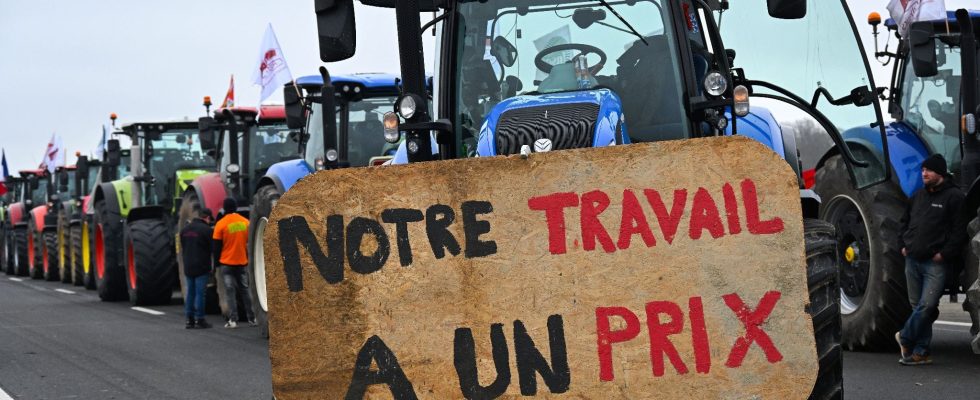The virus has already spread within the ranks of the SNCF and in the union world in general. Is it reaching the National Federation of Farmers’ Unions (FNSEA), the leading corporation in the agricultural world? Like the strike that hit the SNCF in December 2022, born from a Facebook group, or the Inter Urgences collective, which emerged at the hospital in 2019, part of the movement which is shaking the profession seems independent of the unions. . The anger of the farmers, which started on January 18 from a blockage of the A64 in Carbonne, in Haute-Garonne, was without label. Lifted a little over a week later, the barrier was organized around a WhatsApp loop of around thirty people. It was imitated in Occitania before spreading almost everywhere in France.
Added to this revolt on the ground is the push of other farmers’ unions, such as the Confédération paysanne, classified on the left, and the Rural Coordination, increasingly approached by the extreme right. Saturday January 27, the Lot-et-Garonne section (nicknamed the “Yellow Caps”) of the latter announced that it wanted to “block Rungis” and its international market. A few hours later, representatives of the FNSEA in turn announced the intention to launch a “siege”, this time of the entire capital. Faced with this escalation, it is difficult not to see a desire to keep control of the movement and, in general, of an increasingly fractured peasant world. There are many issues at stake for the agricultural union. This anger erupts one month before the Agricultural Show and less than five months before the European elections. It also takes place exactly one year before the professional agricultural elections, until now largely dominated by the FNSEA.
Unions “too soft”
Well aware of the need to maintain control on the ground, the unions are trying to organize and supervise it. Not without locally admitting to having difficulty “holding” the troops. Overflows have also been observed in the wake of the blockages. In Clermont-l’Hérault – in Hérault – a supermarket parking lot was plowed with a backhoe. In Aude, in Narbonne, a building of the Mutualité sociale et agricole was set on fire. The trade unionists of the FNSEA and the Young Farmers (JA) dissociate themselves from these actions, but warn. “Today, many have nothing to lose,” points out Rémi Dumas, winegrower in Hérault and vice-president of the JA. The observation is shared by Damien Garrigues, arborist in Montauban, head of the Departmental Federation of Farmers’ Unions (FDSEA) of Tarn-et-Garonne: “We must channel the farmers, bring them in on certain points. Otherwise , it can become anything. Some find the unions too soft.” In fact, many turn away from it – or lose interest in it. In 2019, the abstention rate in professional elections, won by more than 55% by the FNSEA and its ally, the JA, exceeded 70%.
Crises are certainly not foreign to the agricultural union. Since its founding in 1946, the organization has even experienced several episodes leading to divisions, around the common agricultural policy (CAP) or productivism. Today, a similar movement seems to be occurring among farmers. “We observe on the ground a diversion of the base, which is expressed especially in the regions where the FNSEA is not in the strongest strength,” indicates the historian Edouard Lynch, professor of contemporary history at Lumière University. Lyon II. This “movement of mood” in the field was particularly marked at the start of 2023, with the arrival of Arnaud Rousseau, current boss of the FNSEA, at its head. “His profile did not send a very positive signal to some farmers,” said Edouard Lynch. Originally a broker, Arnaud Rousseau is the buyer of his 700-hectare family farm, and the president of Avril, one of the major French agri-food groups. “Since the 1960s, breeders have run the FNSEA, not grain growers,” points out Alexandre Hobeika, researcher in political science and author of a thesis on the FNSEA. The arrival of Arnaud Rousseau, after Xavier Beulin from 2010 to 2017 – another former president of the Avril group – is viewed with concern by breeders and small farmers.” Clearly, cattle and pig breeders, whose income are on average the lowest in the sectorfear being less well defended by the grain growers, whose business is more flourishing.
Gear change
Between 2022 and 2023, the turnover of cereal producers certainly depends largely on breeders: the animal feed industry is even “the leading user of grain cereals”, according to the Intercéales website, the interprofessional structure of the French cereal sector. But things are changing. “Meat consumption is decreasing in Europe, and it is being replaced by an increased consumption of plants,” continues Alexandre Hobeika. “A relationship of competition risks taking precedence over complementarity.” The Avril group, which had invested in the animal agri-food industry, has changed gear in recent years. “He sold part of his animal product processing tools to concentrate on the valorization of plant products,” indicates the researcher.
A sign of the times, the “without label” protest was also launched in Carbonne by… a cattle breeder, Jérôme Bayle – however cantonal delegate of the FDSEA. On site, another breeder, Guillaume Bénazet, Haute-Garonne departmental secretary for Young Farmers, summed up on the spot the desire to no longer be affiliated with any union: “I am a union member but today, that no longer means anything say, he told us last week. We no longer have the impression that the unions represent us in front of politicians.” A feeling destined to spread? “The mobilization, first carried out by breeders from peripheral regions, has now passed into the hands of grain growers from Ile-de-France,” summarizes Alexandre Hobeika. “This risks raising questions from breeders.” And to cause a new fracture?
.
